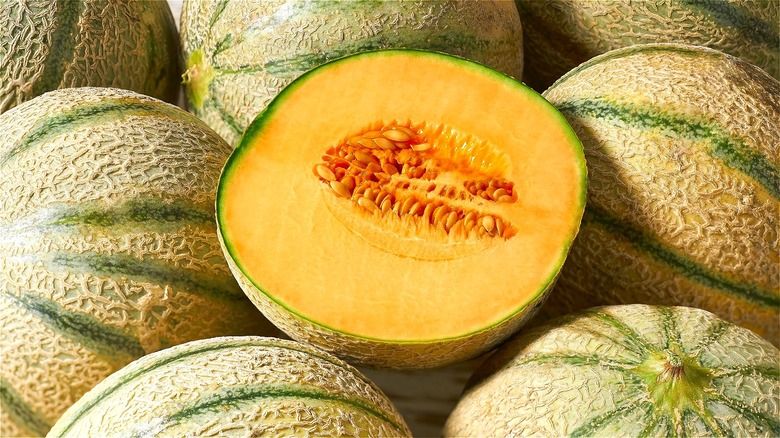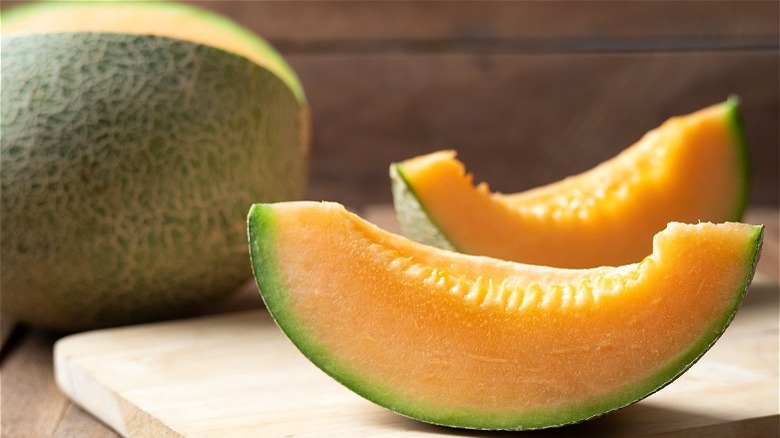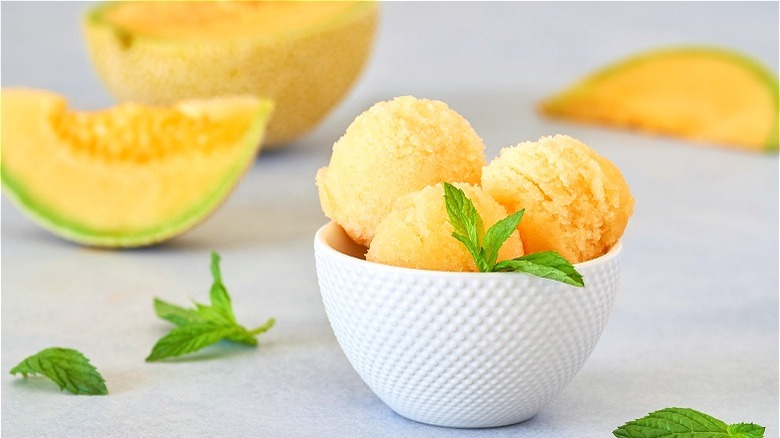The Clever Thing To Do With Overripe Cantaloupe
Cantaloupe is one of those fruits that's difficult to guess its predicated taste since these round melons are covered with a thin medium-skinned rind and inner seeds that are perfect for roasting and eating, via Specialty Produce.
Even though cantaloupe flesh is difficult to judge at the store, there are measures you can take to extend its shelf life once purchased. If you don't plan on eating the melon right away, the USDA recommends storing whole fruit in cold storage under 41 degrees Fahrenheit. At the ideal temperature and level of humidity, cantaloupe can last for as long as 21 days, yet in airing on the side of caution, the USDA claims in most cases, five days is your safest bet. If left on the counter, cantaloupe usually has a shelf life of 48 hours. Yet, sometimes life takes hold and we forget to refrigerate our favorite fruits. If this is the case, there's one clever way to preserve your overly ripe cantaloupe.
One creative solution for salvaging soft cantaloupe
If you're trying to determine if your food has gone bad, cantaloupe is not straightforward since some outer blemishes have no effect on the inner fruit. Does It Go Bad? claims cantaloupe that feels super lightweight, which can indicate a loss of moisture, should be discarded along with any fruit that smells unpleasant. However, if there are outer bruises and a few moldy patches, fruit is typically safe to eat if the mold is cut out properly. According to the PostHarvest Center at the University of California, most bruised cantaloupes are safe to eat, as long as any outer mold has not made its way to the flesh.
If you're still about to throw away an overtly ripe cantaloupe, you should first try this trick to preserve any salvageable remains. Chef Lance Knowling shares his method with Food & Wine. He first chops up the soft melon and then runs the pieces through a blender and cooks the puree down in a pan with lemon until a concentrated spread forms. After running the cooked fruit through a filter, the resulting mixture mimics the consistency of an apple or pear butter and can be spread on baked goods or added to various dishes. Yet, surprisingly, this isn't the only way to preserve soft cantaloupe.
Other methods for saving cantaloupe
There are ways you can preserve your melon even longer than a three-week stay in your refrigerator. First off, the ANR of the University of California claims canning cantaloupe isn't recommended due to the high pH levels of melons. If canned improperly, cantaloupes can cause bacterial growth which can lead to botulism. While canning isn't recommended, The Purposeful Pantry outlines how to successfully dry cantaloupe and even PopSugar provides a chewy recipe that mirrors the consistency of dried mango with just a few simple steps using your oven.
Yet the most popular method of preserving melon is done by freezing. MasterClass claims cleaned and diced cantaloupe that has been flash frozen on baking sheets can be properly stored in plastic bags for as long as six months in your freezer. MasterClass even suggests dusting cubed cantaloupe with sugar to help maintain the fruit's color and flavor. Whether you decide to savor your softer cantaloupe by making it into a fruit butter, or freezing it for a later date, you have more than one option to preserve your next cantaloupe if it sits a day or two longer than recommended.


